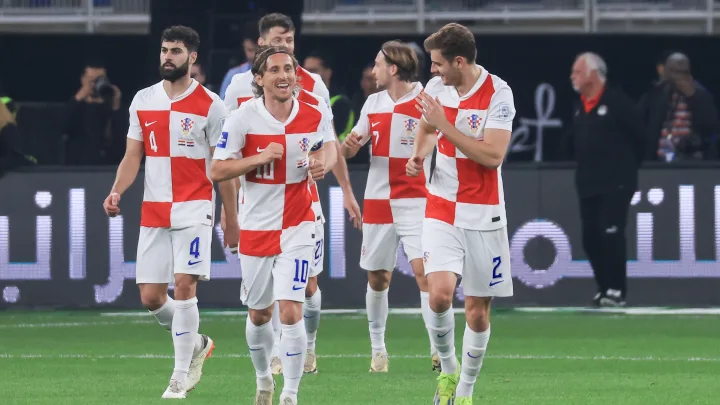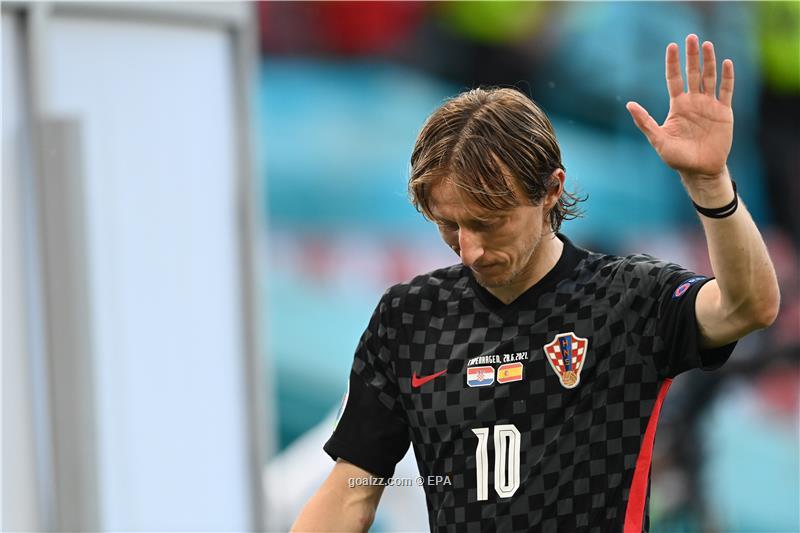Luka Modric, having dominated international football for years with their possession-based “tiki-taka” style, Spain’s switch to a faster, more direct approach saw them cruise to an easy 3-0 win over Croatia on Saturday as they laid down a marker for Euro 2024.
The previous day, Croatia coach Zlatko Dalic had spoken about how the current Spain side tried to move the ball into attacking areas more quickly, and when Croatia failed to make the ball stick in attack midway through the first half, the Spaniards showed exactly what he meant.
Marc Cucurella’s clearance found Rodri in midfield, and he passed calmly to Fabian Ruiz – a couple of touches later, the midfielder split the defence with a sublime ball to Alvaro Morata and he slotted it home. Croatia never recovered.
For all the success Spain had with tiki-taka, winning the Euros in 2008 and 2012 either side of a World Cup win in South Africa in 2010, it was often criticised as being a style based on passing for the sake of it, rather than trying to score.
Instead, the Spaniards held possession for long periods, tiring out opponents with their patient probing before striking quickly in the final third for simple, devastating goals.
The adoption of a more modern and energetic pressing style by many teams blunted their previous possession game, but it also gave rise to their current take on attacking play, which seeks to create goal-scoring chances more quickly.
The Spanish attack was not limited to rapier-like thrusts through the middle either – though Lamine Yamal’s name will be in the headlines as he became the youngest player ever to play at the Euros, his fellow winger Nico Williams also deserves his share of the plaudits.
Though he crossed perfectly for Spain’s third goal, the 16-year-old Yamal took time to grow into the game, but Williams was a threat from the off, constantly trying to get his defender onto the wrong foot and steal into the space behind him.
The introduction of Dani Olmo after the break gave a mouth-watering taste of what the future of Spanish football might look like, with Yamal, Williams and Olmo all looking to square their shoulders toward the opponent’s goal and attack with gusto.
In contrast, it looks like the end of the road for some of Croatia’s greatest-ever players.
Luka Modric can still put a pass through the eye of a needle, but teams no longer give him the space to do so, and the introduction of Ivan Perisic at 3-0 down seemed like an attempt to summon the past in an effort to change the present.
Croatia’s afternoon was summed up when Bruno Petkovic missed a penalty and then had a goal form the rebound ruled out after his team mates encroached during his original spot kick, leaving them without even a consolation goal.
Spain, on the other hand, could cruise through the second half as if it was a friendly, testing tricks and combinations that might pay dividends later in the tournament, if their success with their new-found vertical football persists.

Overview
Luka Modric—a name linked with football brilliance—has played a crucial role in Croatian football for over ten years. A recent game between Spain and Croatia has sparked conversations about whether the torch is being passed to a new generation as the debate regarding the end of his reign gains traction. Let’s explore this fascinating shift in European football.
An Uprising for Luka Modric
Luka Modric’s path from a childhood in Croatia devastated by conflict to the top of the game is genuinely inspirational. Dinamo Zagreb gave him a breakthrough in his early career, sending him soaring to the world scene. After joining Tottenham Hotspur and then Real Madrid, Modric began an incredible career that has yielded many honors, including multiple Champions League wins and a Ballon d’Or in 2018.
The Effect of Modric on Croatian Football
In addition to being a fantastic player for his teams, Modric has been a ray of hope for Croatian soccer. His on-field leadership was crucial to Croatia’s incredible run to the 2018 World Cup final. With his unwavering work ethic, flawless vision, and passing accuracy, Modric has raised the standard for players.
Croatia vs. Spain: The Latest Match
There was a philosophical confrontation in the recent encounter between Croatia and Spain. Croatia’s tactical skill and experience contrasted with Spain’s young vitality and fast pace. The game served as evidence of how European football’s dynamics are changing.
Spain’s Expertise in Tactics
Spain demonstrated their tactical prowess with fast transitions and intense pressing. Key roles were played by the young players in the Spanish team, such as Ansu Fati and Pedri. Their playstyle demonstrated a generational transition in sharp contrast to Croatia’s more systematic approach, with their pace and inventiveness.
The Match’s Tipping Point
The contest was distinguished by a few pivotal moments. Spain’s constant pressure caused the Croatian defense to make crucial errors. Fast counterattacks and skillful finishing swung the balance in favor of Spain. It was clear that Croatia could not keep up with Spain’s speed, which represented a dramatic change in momentum.
Luka Modric: A Reducing Power?
Modric’s performance in the encounter sparked debate regarding his impact on the game. The physical constraints of keeping up with Spain’s tempo were evident, even though his passing and vision remained excellent. The Croatian maestro is aging and weary, which might reduce his supremacy on the field.
The Up-and-Comers in Spain
During the game, several young Spanish talents came to light. In addition to making a substantial impact, players like Pedri, Gavi, and Ansu Fati have shown their ability to guide Spain into a new phase of footballing success. Their success suggests that Spanish football has a promising future.
Croatian Football’s Future
With the possibility that Modric’s time is running out, Croatia must rebuild. Finding heirs and incorporating fresh talent into the group will be essential. The Croatian Football Association must plan forward to stay competitive in international football.
Supporter Responses and Press Attention
Both fans and the media had differing opinions on the match’s outcome. Croatian supporters voiced worries about their team’s future without Modric, while Spanish supporters rejoiced at the win and the emergence of fresh talent. These opinions were supported by media analysis, which emphasized Croatia’s need to change and adapt.
Comparing the Eras: The New Generation vs. Modric
When contrasting Modric’s generation with the current one, it is clear how football styles have changed over time. Although Modric’s era was distinguished by tactical insight and experience, the current tendency tends to favor quickness, skill, and youth. This change is a logical development in the dynamic world of football.
Key Takeaways from the Match
Teams all across the world can learn a lot from this contest. It emphasizes the value of flexibility and the necessity to balance youth and experience. The most important lesson for Croatia is how urgently we need to develop young players who can step in for Modric. For Spain to succeed going forward, keeping this momentum will be essential.
An Era Coming to an End?
Does this mean that Luka Modric’s career is over? His legacy is deeply ingrained in football history, even though his influence may diminish. Although Modric’s probable retirement will be a big deal for Croatian football, it also allows younger players to step up and take the mantle.
In summary
The Spain vs. Croatia game is a microcosm of the more significant shifts in European soccer. It was a generational transition as Croatia’s experience lost to Spain’s speed and youthful exuberance. Though Luka Modric’s era of incredible accomplishments is ending, his legacy will never disappear. In the meantime, Croatian and Spanish football have exciting futures ahead of them, thanks to the emergence of new talent.
Also Read : Why Team India is essential for the survival of Test cricket
